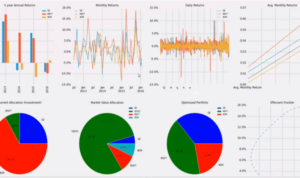Diving into the world of income-generating investments, get ready to learn about different ways to grow your money and secure your financial future. From real estate to stocks and bonds, this overview will give you the lowdown on making your money work for you.
Get ready to uncover the secrets of smart investing and discover how to make the most of your hard-earned cash.
Types of Income-Generating Investments
Income-generating investments are financial instruments that provide regular income to investors. These investments can come in various forms, each with its own risk profile and liquidity. Let’s explore some common types of income-generating investments and discuss their characteristics.
Real Estate Investment Trusts (REITs)
REITs are companies that own, operate, or finance income-producing real estate across a range of property sectors. Investors can buy shares in REITs, which then distribute a portion of the rental income generated from the properties to shareholders in the form of dividends.
Bonds
Bonds are debt securities issued by governments, municipalities, or corporations to raise capital. Investors who purchase bonds are essentially lending money to the issuer in exchange for regular interest payments over a specified period. Bonds are generally considered less risky than stocks but offer lower potential returns.
Dividend-Paying Stocks
Dividend-paying stocks are shares of companies that distribute a portion of their profits to shareholders in the form of dividends. These stocks can provide a steady source of income through regular dividend payments, in addition to the potential for capital appreciation.
Savings Accounts and Certificates of Deposit (CDs)
Savings accounts and CDs are traditional income-generating investments offered by banks. While they may offer lower returns compared to other investments, they are considered safer and more liquid. Savings accounts provide easy access to funds, while CDs offer higher interest rates for locking in funds for a specific period.
Peer-to-Peer Lending
Peer-to-peer lending platforms allow individuals to lend money directly to borrowers, bypassing traditional financial institutions. Investors earn interest on the loans they fund, generating a stream of income based on the borrower’s repayment schedule. However, peer-to-peer lending carries higher default risk compared to other investments.
Comparison of Risks and Liquidity
Each type of income-generating investment carries its own set of risks and liquidity considerations. Real estate investments and dividend-paying stocks may offer higher returns but come with market volatility and potential capital loss. Bonds and savings accounts, on the other hand, are generally considered safer but offer lower returns. Liquidity varies across these investments, with stocks and bonds being more liquid than real estate or peer-to-peer lending.
Real Estate Investments
Investing in real estate can be a lucrative way to generate income. Not only do you have the potential for rental income, but you also benefit from property appreciation over time. Real estate is considered a tangible asset, providing a sense of security and stability compared to other investment options.
Benefits of Real Estate Investments
- Diversification: Real estate can help diversify your investment portfolio, reducing overall risk.
- Passive Income: Rental properties can provide a steady stream of passive income.
- Tax Advantages: Real estate investors can benefit from tax deductions on mortgage interest, property taxes, and depreciation.
Evaluating Real Estate Properties
When evaluating properties for income generation, consider factors such as location, rental demand, potential rental income, property condition, and market trends. Conduct a thorough analysis of the property’s financial performance, including operating expenses, vacancy rates, and potential for appreciation.
Maximizing Income Strategies
- Optimize Rental Rates: Research local rental market trends to set competitive rental rates.
- Property Improvements: Enhance the property’s value through renovations or upgrades to attract higher-paying tenants.
- Property Management: Efficient property management can help reduce vacancies and maintenance costs, maximizing income potential.
Stock Market Investments
Investing in the stock market can be a great way to generate income over time. Stocks represent ownership in a company, and as the company grows and becomes more profitable, the value of the stock can increase, providing capital gains. Additionally, many stocks pay out dividends to shareholders, which can be a source of regular income.
Factors to Consider When Selecting Dividend-Paying Stocks
When choosing dividend-paying stocks for income generation, it is important to consider the following factors:
- The company’s track record of paying dividends: Look for companies with a consistent history of paying dividends to their shareholders.
- The dividend yield: This is the percentage of the stock price that is paid out in dividends annually. A higher dividend yield can mean more income for investors.
- The company’s financial health: Make sure the company has a strong balance sheet and cash flow to support its dividend payments.
- The industry and market conditions: Consider how the company operates within its industry and how external factors may impact its ability to pay dividends.
Income Potential of Growth Stocks vs. Dividend Stocks
Growth stocks are companies that are expected to grow at a faster rate than the average market, but they may not pay dividends. On the other hand, dividend stocks are typically more established companies that pay out a portion of their earnings to shareholders in the form of dividends. While growth stocks offer the potential for capital appreciation, dividend stocks provide a steady stream of income through regular dividend payments. Investors should consider their investment goals and risk tolerance when deciding between growth stocks and dividend stocks.
Bonds and Fixed-Income Investments

When it comes to generating income, bonds and fixed-income investments play a crucial role in providing a steady stream of returns for investors. Unlike stocks, which represent ownership in a company, bonds are debt securities issued by governments, municipalities, or corporations to raise capital. Investors who purchase bonds are essentially lending money to the issuer in exchange for periodic interest payments and the return of the principal amount at maturity.
Relationship between Bond Prices, Interest Rates, and Income Generation
Bonds and interest rates have an inverse relationship – when interest rates rise, bond prices fall, and vice versa. This is because existing bonds with lower interest rates become less attractive compared to new bonds issued at higher rates, causing their prices to decrease. On the other hand, when interest rates decline, existing bonds with higher rates become more valuable, leading to an increase in their prices.
- When interest rates rise, bond prices fall, resulting in a decrease in the value of the bond holdings.
- Conversely, when interest rates decrease, bond prices rise, increasing the value of the bond holdings.
- Investors can also generate income through capital gains by selling bonds at a higher price than what they paid.
Types of Bonds for Income Generation and Risk Levels
Different types of bonds are commonly used for income generation, each with varying risk levels based on the issuer and creditworthiness. Some of the common types include:
- Government Bonds: Issued by governments, considered low-risk due to the backing of the government’s taxing power.
- Corporate Bonds: Issued by corporations, offer higher yields but come with higher credit risk compared to government bonds.
- Municipal Bonds: Issued by municipalities, provide tax-exempt income for investors but carry varying levels of credit risk.
- High-Yield Bonds: Also known as junk bonds, offer higher yields but come with a higher risk of default due to lower credit ratings.






